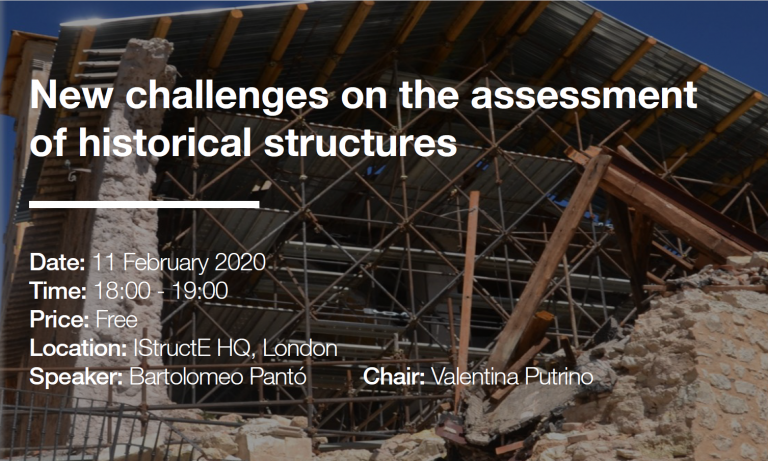First 2020 Young SECED Evening Meeting
3 February 2020
Dr Bartolomeo Pantò from Imperial College will be the speaker of the first Young SECED evening meeting for 2020. EPICentre members have contributed to organising the event.

The first Young SECED evening meeting for 2020 will see Dr Bartolomeo Pantò from Imperial College giving a talk on "New challenges on the assessment of historical structures". The presentation will take place on 11 February (6pm) at the Institution of Structural Engineers HQ in London. This meeting is co-organised by EEFIT, IStructE London YMG and Young SECED. EPICentre members and Young SECED Committee members Valentina Putrino (Chair), Dr Arash Nassirpour and Dr Marco Baiguera have contributed to the event organisation.
Synopsis
Historical and monumental masonry structures represent an important cultural heritage of humanity. These structures are often located in high-seismic regions and built without following specific seismic design standards. Therefore, the seismic vulnerability assessment of this structural typology is a crucial topic within different fields concerned with the evaluation and management of seismic hazard. The seismic response of masonry structures is extremely difficult to predict due to the high uncertainty associated with mechanical, geometrical and structural parameters. In this lecture, an original discrete macro-element method (DMEM), is presented. The model can be successfully used for different engineering purposes and in particular for the seismic assessment of unreinforced and reinforced masonry structures. After a basic description of the theoretical aspects, some representative case studies are presented and discussed.
Speaker
Dr Bartolomeo Pantò is a research fellow at Imperial College, where he is a member of the structures research group. His research activity is mostly focused on the development of numerical models for the simulation of the non-linear behaviour of masonry and reinforced concrete structures. The main research area is the evaluation of the seismic behaviour of existing constructions, with particular emphasis on historical and monumental buildings, and seismic retrofit techniques based on innovative composite materials. At Imperial College, he is developing the RAMBEA (Realistic Assessment of historical Masonry Bridges under Extreme environmental Actions) project (funded by the European Commission within the framework Horizon 2020 framework program).
Further information
Attendance at this meeting is free. No need to register. Seats are allocated on a first come, first served basis. Tea, coffee and biscuits will be served from 5.30pm. The meeting commences at 6pm and should end no later than 7pm.
Links
 Close
Close

